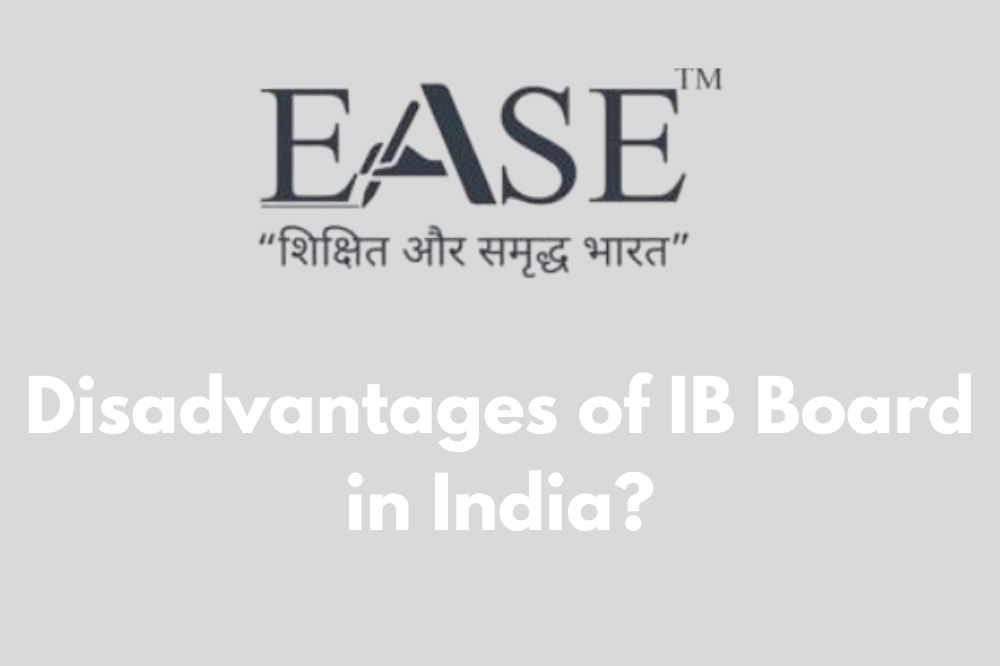The International Baccalaureate (IB) Board is known for its global curriculum, focusing on critical thinking, research, and holistic learning. While IB offers several advantages, it also has certain drawbacks, especially in the Indian education system.
This guide explores the key disadvantages of IB Board in India, helping students and parents make an informed decision.
High Cost & Expensive Fees
- IB schools charge significantly higher tuition fees compared to CBSE, ICSE, or state boards.
- Additional costs include books, projects, and international assessments, making it less accessible for middle-class families.
- Limited Availability of IB Schools
IB schools are not widely available across India, mainly concentrated in metro cities like Delhi, Mumbai, Bangalore, and Hyderabad.
Students in tier-2 and tier-3 cities may struggle to find IB schools nearby.
Read More RBSE vs CBSE
Curriculum Misalignment with Indian Competitive Exams
IB focuses on concept-based learning, but does not align well with Indian entrance exams like JEE, NEET, and UPSC.
Students may need extra coaching to prepare for these exams, as IB lacks emphasis on rote learning and exam-oriented studies.
Difficulty in Transitioning to Indian Universities
Some Indian universities prefer CBSE or ICSE students, making IB graduates face challenges in admission criteria.
IB grading system differs from percentage-based evaluation, which may create confusion during college admissions.
Heavy Workload & Stressful Assessments
IB students must complete Extended Essays, Theory of Knowledge (TOK), and Creativity, Activity, Service (CAS) projects.
The rigorous coursework can lead to stress and burnout, especially for students who struggle with self-paced learning.
Read More Top Medical Courses After 12th Without NEET
Teacher Training & Availability Issues
IB schools require specialized teacher training, making it challenging to find qualified IB educators in India.
Some schools may lack experienced IB faculty, affecting the quality of education.
Emphasis on English Over Regional Languages
IB curriculum is English-centric, which may pose difficulties for students from non-English backgrounds.
Limited focus on Indian languages and literature, reducing exposure to regional culture and heritage.
Cultural Disconnect & Lack of Indian Context
IB syllabus focuses on global perspectives, sometimes overlooking Indian history, culture, and traditions.
Students may feel disconnected from local education systems and societal norms.
Read More New Education Policy 2024
FAQ | Disadvantages of IB Board in India
Is IB Board expensive compared to CBSE and ICSE?
Yes, IB schools have higher tuition fees, making them less affordable for many families.
Does IB prepare students for Indian competitive exams like JEE & NEET?
No, IB focuses on concept-based learning, but lacks exam-oriented preparation for JEE & NEET.
Are IB schools available in all Indian cities?
No, IB schools are mainly in metro cities, with limited presence in smaller towns.
Do Indian universities accept IB students?
Some universities prefer CBSE/ICSE students, making IB graduates face admission challenges.
Is IB curriculum stressful for students?
Yes, IB has rigorous coursework, including Extended Essays, TOK, and CAS, which can be stressful.
Are IB teachers easily available in India?
No, IB requires specialized training, and finding qualified IB teachers can be difficult.
Does IB focus on Indian languages and culture?
No, IB is English-centric, with limited emphasis on Indian languages and traditions.
Is IB suitable for students planning to study in India?
IB is better for students aiming for international universities, but may not be ideal for Indian college admissions.
Conclusion
While IB offers global exposure and holistic learning, it has several disadvantages in the Indian education system, including high costs, limited availability, misalignment with Indian exams, and cultural disconnect. Students aiming for Indian competitive exams or local universities may find CBSE or ICSE more suitable.

